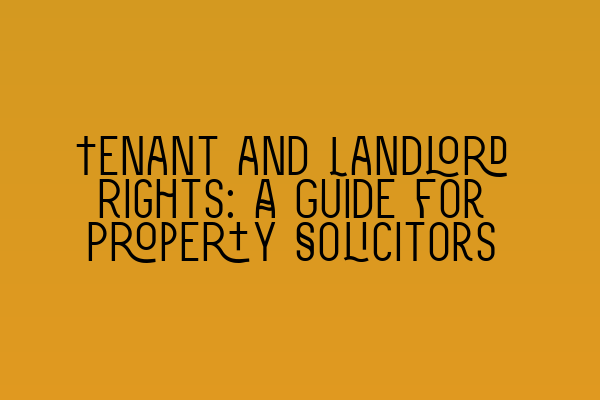Tenant and Landlord Rights: A Guide for Property Solicitors
As a property solicitor, it’s essential to have a thorough understanding of tenant and landlord rights. Knowing the rights and obligations of both parties is crucial when providing legal advice and representing clients in property-related matters. In this comprehensive guide, we will explore the fundamental rights of tenants and landlords, common legal issues that may arise, and how to navigate the ever-changing landscape of property law.
Tenant Rights
Tenants have specific rights that are protected under the law. Understanding these rights is essential for property solicitors to ensure their clients are fully informed. Here are some key tenant rights to be aware of:
- Right to a Habitable Property: Tenants have the right to live in a property that meets certain standards of habitability. This includes having a safe and well-maintained environment, functional plumbing and electrical systems, and adequate heating.
- Right to Privacy: Tenants have the right to privacy and should not be subjected to unwarranted intrusions by landlords or property owners.
- Right to Notice: Landlords must provide tenants with proper notice before entering the rental property, unless there is an emergency. The notice period may vary depending on local housing laws.
- Right to Security Deposit: Tenants have the right to receive a full refund of their security deposit, minus any legitimate deductions, within a reasonable time frame after moving out.
- Right to Non-Discrimination: Landlords must not discriminate against tenants on the basis of race, religion, gender, disability, or other protected characteristics. This includes both the initial screening process and ongoing tenancy.
These are just a few examples of tenant rights, and it’s crucial for property solicitors to be well-versed in the specific regulations and laws within their jurisdiction.
Landlord Rights
While tenants have their rights, landlords also have certain rights that deserve protection. Property solicitors must advise their clients on these rights to ensure all parties are treated fairly. Here are some key rights of landlords:
- Right to Collect Rent: Landlords have the right to collect rent from tenants in a timely manner, as outlined in the lease agreement.
- Right to Evict: In certain circumstances, landlords have the right to evict tenants who have violated the terms of the lease agreement, failed to pay rent, or engaged in illegal activities on the property.
- Right to Maintain Property: Landlords have the responsibility to maintain the property, but they also have the right to access the premises for repairs or inspections, provided proper notice is given.
- Right to Screen Tenants: Landlords have the right to screen potential tenants to ensure they are qualified and responsible individuals who will uphold their obligations.
It’s important for property solicitors to guide landlords through the legal process to exercise their rights properly and avoid potential litigation.
Common Legal Issues
Property solicitors often encounter various legal issues related to tenant and landlord rights. Being proactive in resolving these issues is crucial to maintaining positive relationships between parties. Some common legal issues include:
- Rent Arrears: When tenants fail to pay rent on time or in full, landlords may need to take legal action to recover the outstanding amount.
- Lease Agreement Disputes: Disputes may arise over the interpretation or enforcement of lease agreements, such as disagreements over repairs and maintenance responsibilities.
- Unlawful Evictions: Landlords must follow the proper legal procedures when evicting tenants. Unlawful evictions can lead to significant legal consequences.
- Deposit Deductions: Disputes may arise over the deductions made from the security deposit after a tenant moves out. Property solicitors can assist in resolving these disputes through negotiation or legal action.
Understanding these common legal issues and having the knowledge to address them effectively is crucial for property solicitors to provide the best possible representation for their clients.
Navigating the Changing Landscape of Property Law
Property law is constantly evolving, and property solicitors must stay current with the latest legal developments and regulations. Staying informed can be achieved through continuing professional development, attending relevant seminars, and participating in legal networks.
Additionally, becoming an expert in property law requires ongoing education and staying attuned to changes in legislation and case law. This knowledge is crucial for providing accurate and reliable legal advice to clients.
To further deepen your understanding of property law, you may consider enrolling in SQE preparation courses, such as SQE 2 Preparation Courses and SQE 1 Preparation Courses. These courses offer comprehensive study materials, mock exams, and practice quizzes to enhance your knowledge and prepare you for the SRA SQE exams.
In conclusion, as a property solicitor, it is vital to have a thorough understanding of tenant and landlord rights. By staying informed, addressing common legal issues proactively, and navigating the changing landscape of property law, you can effectively serve your clients and provide expert legal advice.
For more information on SQE exams, you can refer to the following related articles:
